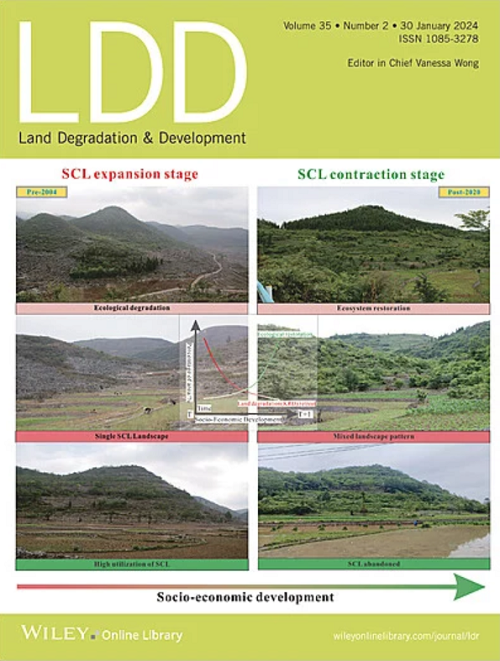Land Degradation and Development Perspective of COP27 in the View of Green Energy, Agriculture, and Water Productivity: Novel Evidence From Emerging Economies
IF 3.6
2区 农林科学
Q2 ENVIRONMENTAL SCIENCES
引用次数: 0
Abstract
This study explores the interplay between land and water productivity and green energy in emerging economies' environmental degradation. Since COP27 and COP28, they have paid more attention to the appropriate land management, food security, and green energy transition to overcome the global food and energy demand and attain sustainable development without harming environmental quality. Therefore, this research tends to contribute to the ongoing research on the climatic changing factors in the group of emerging economies, including India, Mexico, Russia, Pakistan, China, and Brazil. The study deals with the panel data covering the period from 1990 to 2022. Using sophisticated second-generation panel diagnostic approaches, the research found cross-section dependence, slope heterogeneity, and the presence of long-run equilibrium relationships between stationary variables. For the long-run analysis, this research uses Driscoll–Kraay fixed effect and random effect regression models. The research concludes that economic development and agriculture, forest, and fishing, value added (referred to as land degradation) are the significant drivers of carbon emissions, which improves environmental degradation. On the other hand, the results revealed that green energy use and water productivity significantly reduce the emissions level and improve the region's environmental quality. The results are robust and are authenticated by linear regression heteroskedastic panels corrected standard errors. This research recommends further investment in research and development, green energy, and water productivity projects. However, policymakers should revise the existing policies regarding agriculture value added and economic growth norms while replacing traditional practices.绿色能源、农业和水生产力视角下的COP27土地退化与发展:来自新兴经济体的新证据
本研究探讨了新兴经济体环境退化中土地和水生产力与绿色能源之间的相互作用。自COP27和COP28以来,他们更加关注适当的土地管理,粮食安全和绿色能源转型,以克服全球粮食和能源需求,在不损害环境质量的情况下实现可持续发展。因此,本研究倾向于为正在进行的新兴经济体集团(包括印度、墨西哥、俄罗斯、巴基斯坦、中国和巴西)的气候变化因素研究做出贡献。该研究处理了1990年至2022年期间的面板数据。使用复杂的第二代面板诊断方法,研究发现了横截面依赖性、斜率异质性以及平稳变量之间长期平衡关系的存在。对于长期分析,本研究采用Driscoll-Kraay固定效应和随机效应回归模型。研究得出的结论是,经济发展和农业、林业和渔业的增值(即土地退化)是碳排放的重要驱动因素,从而改善了环境退化。另一方面,绿色能源利用和水生产力显著降低了排放水平,改善了区域环境质量。结果是稳健的,并通过线性回归异方差面板校正标准误差验证。该研究建议进一步投资于研发、绿色能源和水生产力项目。然而,政策制定者应该在取代传统做法的同时,修订有关农业增值和经济增长规范的现有政策。
本文章由计算机程序翻译,如有差异,请以英文原文为准。
求助全文
约1分钟内获得全文
求助全文
来源期刊

Land Degradation & Development
农林科学-环境科学
CiteScore
7.70
自引率
8.50%
发文量
379
审稿时长
5.5 months
期刊介绍:
Land Degradation & Development is an international journal which seeks to promote rational study of the recognition, monitoring, control and rehabilitation of degradation in terrestrial environments. The journal focuses on:
- what land degradation is;
- what causes land degradation;
- the impacts of land degradation
- the scale of land degradation;
- the history, current status or future trends of land degradation;
- avoidance, mitigation and control of land degradation;
- remedial actions to rehabilitate or restore degraded land;
- sustainable land management.
 求助内容:
求助内容: 应助结果提醒方式:
应助结果提醒方式:


